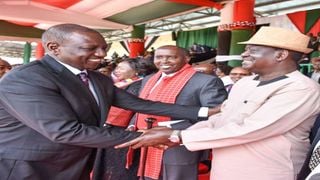
Deputy President William Ruto (left) greets ODM leader Raila Odinga as ANC leader Musalia Mudavadi (right) watches during the 56th Madaraka Day Celebrations at Narok Stadium.
| DPPSPolitics
Premium
Dispute over running mate sparked rift between Raila Odinga, DP William Ruto
This is the fifth part of a serialization of Oburu Oginga's book 'In the shadow of my father'.
In case you missed them, read: Saitoti’s strange behaviour and Kipkalia Kones’ near punch-up with Raila
---------------------
We were received with overwhelming enthusiasm everywhere we went, with boisterous huge crowds turning up to line our way. We combed towns and villages and spoke to people even by the roadsides. All the presidential hopefuls campaigned from the same podium. The momentum we gained from the referendum was intact and we were sure we were headed for a decisive electoral victory.
But even as the presidential hopefuls campaigned together, they all privately campaigned amongst delegates drawn from across the country. These delegates would vote for the presidential candidates on September 1, 2007. The remaining presidential hopefuls now included Raila, Mudavadi, Ruto, Nyagah, Balala and Ngilu.
As the D-day neared, each presidential hopeful formed his own team among the leaders as they started to campaign amongst the delegates. This was extremely crucial and I worked round the clock to help my brother get the nomination certificate. In the Rift Valley we had Kipkalya Kones, Lorna Laboso, Henry Kosgei and Sally Kosgey working tirelessly. Rift Valley was very crucial for us. I rounded up all the delegates from Nyanza and knew they would all vote for Raila.
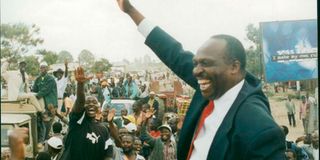
Then Bomet Member of Parliament Kipkalya Kones waves to a crowd at the Bomet-Narok highway after he was barred from addressing a past Madaraka Day rally.
With Nyanza sealed, I joined Ababu Namwamba and Chris Okemo to campaign amongst delegates from the former Western Province. The region was very crucial because of the large numbers and we feared Mudavadi might take all to his side.
All delegates from across the country were in Nairobi by the last day of August. They came in the thousands and were booked in hotels across the city.
I remember walking from hotel to hotel on the eve of voting, pleading with the delegates to vote for Raila. I was accompanied by Okemo and Namwamba when I visited delegates from Western. We moved all night from places like Buru Buru in Eastlands to the CBD and then to Parklands speaking to delegates.
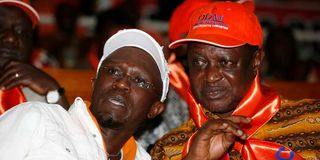
ODM delegates Ababu Namwamba (left) and Oburu Odinga at Kasarani during the National Delegates Convention on February 28, 2014.
I remember delegates from Vihiga and some parts of Western had decided to vote for Mudavadi. When I went to see them, they told off Okemo and Namwamba, who were their tribesmen, accusing them of betrayal. One man shouted that he could understand why I was campaigning for my brother, but the two Luhya men with me, he said, had no business bidding for Raila when their own son in the name of Musalia Mudavadi was also in the race.
We converged at the Intercontinental Hotel at around 5am to review our progress before I rushed home to catch an hour’s nap.
Day Raila, Ruto rift started
I woke up, took a shower and headed for Kasarani, where I continued speaking to delegates as we waited to vote. Balala was the first to withdraw his bid and turn his delegates over to us. Joe Nyagah also followed suit. In the end, only three presidential hopefuls remained.
Raila took a commanding lead as Mudavadi took a distant second. Ruto came in third. When we voted, there was no agreement that the person who came second would be the running mate. And I think that was the day the disagreement between Ruto and Raila started.
Raila had simply invited Mudavadi and held his hand high as though he had declared him the running mate. No one objected and it was taken as an endorsement.
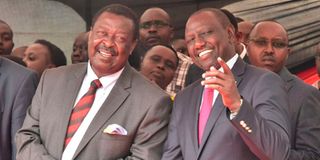
Deputy President William Ruto (right) and ANC leader Musalia Mudavadi.
Ruto had from the beginning felt that he could command more votes than Mudavadi, and therefore he was more suited to become vice president. But as it happened, Mudavadi had campaigned more aggressively amongst the delegates than Ruto had done with the Rift Valley delegates from his backyard.
In spite of all the troubles I faced in Nyanza, all our candidates won. I went to Bondo in the last week to join my first wife, who had been campaigning for me in my absence. I knew I would retain my Bondo seat by a landslide, but I was apprehensive that something may go terribly wrong on the national front. I had this nagging feeling even before I went to vote.
I travelled to Nairobi as soon as the results for my constituency were announced. As usual, it was a landslide victory. Somehow, I was not elated. By contrast, the mood at Kisumu International Airport was quite the opposite. Many friends waved at me and a few approached to congratulate me on my victory. I didn’t accept the congratulatory messages.
Kenyans had been glued to their TV sets for days. At the last count, Raila still led Mwai Kibaki of PNU by more than one million votes. It was an unassailable lead and people knew it.
PNU offer to Kivuitu
Those who congratulated me didn’t know what I knew. A few weeks before elections, a Maasai friend called Ole Tasur had approached me with very disturbing news. He had some reliable information that the PNU side had analysed the statistics forwarded to them by the NIS and concluded that they were going to lose the elections.
They had approached ECK chairman Samuel Kivuitu and offered to extend his term in office, which was due to expire in a short while. In exchange, they wanted the ECK chairman to offer them electoral favours in the General Election. My source informed me that he wasn’t sure whether Kivuitu had agreed or not. He advised me that the only way we could know if Kivuitu agreed to play ball with PNU was to wait and see if he agreed to extend his term. If he didn’t agree, Ole Tasur informed me, then I could rest assured Kivuitu had refused to cooperate with PNU.
Samuel Kivuitu had been unwell and had been saying that he needed to retire. He also said his family had advised him to quit and take a rest. According to Ole Tasur, Kivuitu told the PNU brigade that he would think over their proposal. When Kivuitu agreed to have his term extended, I went to Raila and told him what Ole Tasur had revealed to me. Raila did not believe me at first.
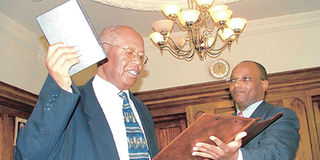
Samuel Kivuitu was appointed on December 2, 1997, and was the seventh elections chief since 1963.
He had a lot of confidence in Kivuitu and he told me he knew Kivuitu could not get involved in such a conspiracy. Days later, I invited both Raila and Ole Tasur for lunch in my home along Lenana Road in Nairobi. Raila then heard it from the horse’s mouth.
Ole Tasur’s sources were impeccable and Raila was stunned. As I boarded the plane in Kisumu, I knew what Ole Tasur had warned about was surely coming to pass. The ECK had temporarily suspended the counting of votes. Nothing was forthcoming.
When I reached Nairobi, I went straight to KICC, where tallying was being done. I found James Orengo, Charity Ngilu and others there. They were at the media centre. I didn’t even know where the tallying was being done and we were not allowed access past the media centre.
Skewed results, total chaos
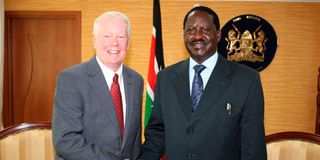
Former US Ambassador to Kenya Michael Ranneberger with then Prime Minister Raila Odinga.
I saw the desperation on everyone’s face when the American ambassador Michael Ranneberger approached us, insisting we should not allow ECK to announce skewed results. He, however, explained that according to the law, they (Americans) would have to accept the ECK’s verdict when formally announced. I thought the Americans had their own intelligence on what was going on.
I remember Martha Karua talking very tough and she seemed to be controlling events for the government. Amos Kimunya also joined in at some point.
After three days the process had reached a point of total chaos and we knew the vote-counting was being doctored when we noticed some constituencies turned in votes that were more than the registered voters.
We went to meet at Pentagon House in Hurlingham immediately after Kibaki was declared winner and sworn in at night. We started receiving reports of violence in some parts of the country while we were there. Many MPs reported what was happening in their areas. The first areas we heard about included Mathare, Kibera and Kariobangi.
I remember seeing the new Kasarani MP Elizabeth Ongoro in the room. She was very incensed and she told us there was no need to stay there while people were being killed. Then Otieno Kajwang walked in as I was informing them that I knew Kibaki very well and didn’t think he was enjoying the bloodletting going on in the country.
I reminded them that Kibaki was indeed not a monster as such but maybe he was just desperate. What if we approached and convinced him to share power with Raila if that could stop the violence in the country? Kibaki would stay in State House and he could remain the head of state, we all reckoned.
Kajwang thought it was a good idea and he suggested we talk to Raila about it. Raila had left earlier and so we followed him to his Karen home. His wife Ida can be quite stubborn when opposed to an idea. I thought the best thing was first to recruit her to my side and more so because she somehow had an influencing effect on her husband.
I was relieved when I called her aside and she admitted that for once, she was happy that someone was coming with a solution. She complained that everyone else had been coming with problems.
Raila readily agreed with my suggestion. He called the Pentagon and the idea was accepted. Mohammed Isahakia then called Head of Civil Service Francis Muthaura, who was very close to Kibaki. Kibaki was very willing to discuss a solution but his group was very adamant that no negotiations could be carried out with ODM. They said ODM wanted to capture power through violence. Some of them had already been named into a provisional Cabinet and rued the idea of negotiating with ODM because this would have jeopardised their new positions.
In the meantime, the violence continued unabated, with high casualties being reported from the Rift Valley. A lot has been written and said about the Kofi Annan negotiations that took place at Serena Hotel. There was a serious push and pull with the Party of National Unity trying to assert their supremacy and entrench themselves from the word go. Power sharing was the main area of contention and PNU continued to play hard ball. Portfolio sharing negotiations finally resulted in a bloated Cabinet and government functions were at some points overlapping, creating more confusion.
Sometime back, when Kofi Annan was still negotiating in Nairobi, I started receiving reports of unusual violence in Nyanza. I gathered that Ugandan soldiers were being brought to Kenya through my constituency. They came by lake, disembarking at the Usenge beach, where unmarked police vehicles would be waiting for them for distribution to other areas like Kisumu, Homa Bay and Muhuru Bay.
Killings
Suspicions were first raised when people discovered that there was a band of armed people who were clearly not Kenyans. They also shot rather indiscriminately, unlike Kenyan security forces, who shot only under provocation. I informed Raila about the killings in Bondo, Busia, Nambale, Homa Bay and Muhuru Bay. It sounded like a strange tale and he was reluctant to believe that soldiers from a foreign country could cross over to massacre our people.
My fears about what was happening were confirmed when the new Speaker of Parliament, Kenneth Marende, requested me to represent him in an East African Legislative Assembly (EALA) meeting in Arusha. I was accompanied by Sotik MP Lorna Laboso. I mentioned the incidents happening in Nyanza to a lady friend from the Teso side of Uganda who was a member of the EALA. She introduced me to Dr Eliya Kategaya, Uganda’s first deputy prime minister and minister for East African Community affairs. Dr Kategaya was forthright with me. First, he informed me that Ugandans were not amused by the actions of our people, especially by uprooting the railway line in Kibera. He said the actions of our people stifled their only lifeline. “So what did you want us to do, sit back and just watch you drive our economy under?” he posed to me.
I was shocked to hear a senior member of Yoweri Museveni’s government making such an unfortunate confession. Dr Kategaya came from the same region as Museveni and their association dates back to their days in primary school. They also attended the same secondary school in Mbarara before heading to the University of Dar es Salaam.
They had joined every rebel group against Idi Amin and Obote together. He was also a founder member of the National Resistance Army, where he served as a brigadier-general. Ugandans always considered Dr Kategaya as number two from Museveni and it was hard to come up with a name that was closer to President Museveni. Therefore, I was sure he had insider knowledge on what was happening.
He later fell sick around the time we met and was flown to the very same country he was complaining about in Arusha. He died weeks later at Nairobi Hospital. I was still in Arusha when I saw breaking news flashes on TV saying Kibaki and Raila had reached a deal at the Sagana State Lodge. I informed Lorna Laboso that this was a significant event and we had to cut short our meeting and fly to Nairobi immediately.
Unbalanced deal
The deal our party leader had signed was not balanced. The ministries of Finance and Internal Security are paramount in the governance of our country. Real state power lies in money and force of arms. I felt that if Kibaki needed Finance, then we should have taken Internal Security. Although we took good ministries like Lands, Local Government and Agriculture, PNU took Energy, another crucial ministry. But I understood we needed to normalise the situation in the country and move on.
I also expected to be appointed into the Cabinet because I thought I was one of the most deserving cases. I had the experience, and also the pedigree, but nevertheless, Raila was under immense pressure from both sides of the political divide. Some MPs lobbied for their own chances using my name. They pointed out that I was Raila’s brother so did not deserve any favour. I always felt that line of argument was nonsensical. I joined elective politics before Raila when I was elected a councillor in 1974. Raila never vied for a seat in Nyanza.
We both started politics at the feet of our father. Raila always had national ambitions while I was content to serve my people of Bondo and continue with my father’s legacy. We were destined to follow different paths but towards the same objective. Many people thought I joined the opposition because of Raila, a view that is incorrect.
It is superfluous to imagine that an Odinga had to support Raila merely because he was a party leader. This can be demonstrated by the fact that, at the writing of this book, one of our brothers is actually a Jubilee politician in Kisumu who is closer to President Uhuru Kenyatta politically than we are. He supported the Jubilee coalition because he agreed with their political principles. In the end, I chose to work as an assistant minister in the Ministry of Finance.
I worked under three Finance ministers while at Treasury. The first was Amos Kimunya, who had continued from where he had left in the previous parliamentary term. Kimunya didn’t have a very good working relationship, especially with Parliament. Some MPs said he treated them with some degree of arrogance, but he always treated me well and we had a good working rapport.
In comparison with other people I worked with, Kimunya preferred doing most of the official duties on his own without delegating much. Kimunya resigned from his position in the heat of the Grand Regency saga. His resignation was spearheaded from Parliament and it was a purely political process.
The campaign against him was very intense and MPs planned to propose a motion of no confidence against him. At one point Kimunya had heatedly informed a public rally that he would rather die than resign. Days later, I saw Head of Civil Service Francis Muthaura enter Kimunya’s office carrying some files. Muthaura was in Kimunya’s office from morning to about 3pm.
I knew there was something serious and when Muthaura left I rushed to ask him what was happening. Kimunya just informed me that he was resigning and asked me to accompany him to the boardroom to make a formal resignation announcement.
Oburu Odinga’s biography, In the Shadow of My Father, will be available on Thursday.




